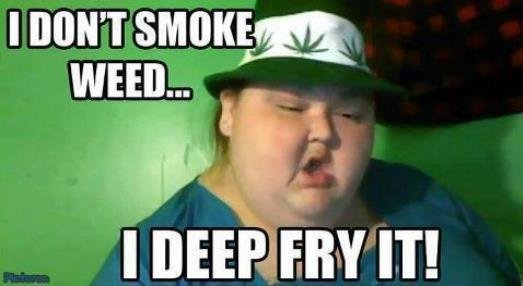Fight Fat like a F*cking Champ
So you are sick of feeling fat, well lets do something about it and let me tell you how to turn up your fat furnace.

So you want to lose weight. Who doesn’t? Chances are, you want to lose the fat and keep the muscle that’s hidden somewhere beneath the layers of fat. Too often, weight loss means losing both fat cells and muscle cells. This is a pretty shitty scenario because muscle cells are ultimately the ones that burn the fat.
In fact..
Muscle tissue burns twice as many calories a day as fat. Each pound of muscle burns seven to ten calories a day. Each pound of fat only burns two to three. You know what this means? The more muscle you have, the higher your metabolism and the faster you’ll lose weight. So that is exactly what you want to do. Pick up some weights and lift these f*ckers till you feel a burn. But there is more you can do. Have you ever compared the muscle on a sprinter and a marathon runner? This sprinter clearly wins.
So what does that teach us ?
I will tell you; you have to H.I.I.T it like its hot.
High Intensity Interval Training.
This sounds complicated but it really isn't. Essentially what you do is you do an exercise as hard as you can, until your whole body body screams: F*ck This Sh!t. Then you do an exercise that feels a lot easier for a bit and you repeat. Simples
Now let me tell you how can you keep valuable muscle and lose fat at the same time
Step 1 : Pile on Protein
When you create a calorie deficit in your efforts to lose weight, your body turns to its own stores of glucose for energy. Where are these stores of energy? In the fat found in adipose tissue and the proteins located in muscle tissue.
In order to keep muscle and lose fat, you’ve got to eat adequate amounts of protein each day. Protein has these things called branched-chain amino acids (leucine, isoleucine and valine) that basically prevents your body from depleting muscle tissue for the energy it needs.
How much protein should you eat?
Take your body weight and aim to eat one to one and a half grams of protein for each pound you weigh. Weigh 200 pounds? Eat 200 to 300 grams of protein throughout the day. It’s that simple.
Good sources of protein include foods such as lean meat, poultry, seafood, beans, peas, eggs, and nuts.
Step 2: Get Stronger
If you’re trying to lose weight through cardio exercise alone, you’ll likely lose your muscle along with the fat. Think of the marathon runner again...
You can lose weight and maintain your muscle by adding strength training to your workout routine two to three days a week for 20 minutes. Yep, that is all it takes, just 20 freaking minutes. You’ll keep muscle as well as build new muscle to help you burn those fat calories faster.
Strength, or resistance training, isn’t difficult. Even if weights scare you, body weight exercises do much the same thing. Just be sure to work all major muscle groups. This includes your calves, thighs, biceps, triceps, back, chest, shoulders, and abdominals.
While cardio exercise does burn more calories in less time, research has shown that those who perform regular strength training as part of their exercise routine are twice as likely to lose weight and keep the weight off as those who don’t include strength training.
step 3: Get Enough Calories
Sure, there must be a calorie deficit to lose weight, but not a large one. Cut too many calories and you’ll have a harder time continuing the diet, committing to exercise, and recovering from your workouts. Too great a calorie deficit also increases the likelihood you’ll lose muscle along with fat. Not getting the nutrition your body needs may lead to muscle loss. Never cut more than 1,000 calories a day. This is the simple rule. Eat as close to nature as possible and i am not talking about a Big-Mac in the park. I am talking about sh!t that is minimally processed.
Step 4: Nourish Your Muscles
Following your strength training workouts, your muscles need special nourishment to heal and strengthen. The stress and tension of resistance on your muscles causes small tears in the muscle fibers. As these tears heal, the muscle becomes stronger and larger. This is called super compensation. Pre- and post-workout meals are important in this healing process. At least an hour prior to your workout, eat a snack of carbs and protein to give your body fuel. And within the first 30 minutes after after your workout, replenish your muscles with a small meal that includes carbs and protein.
Remember: muscle is your friend, shake that fat
